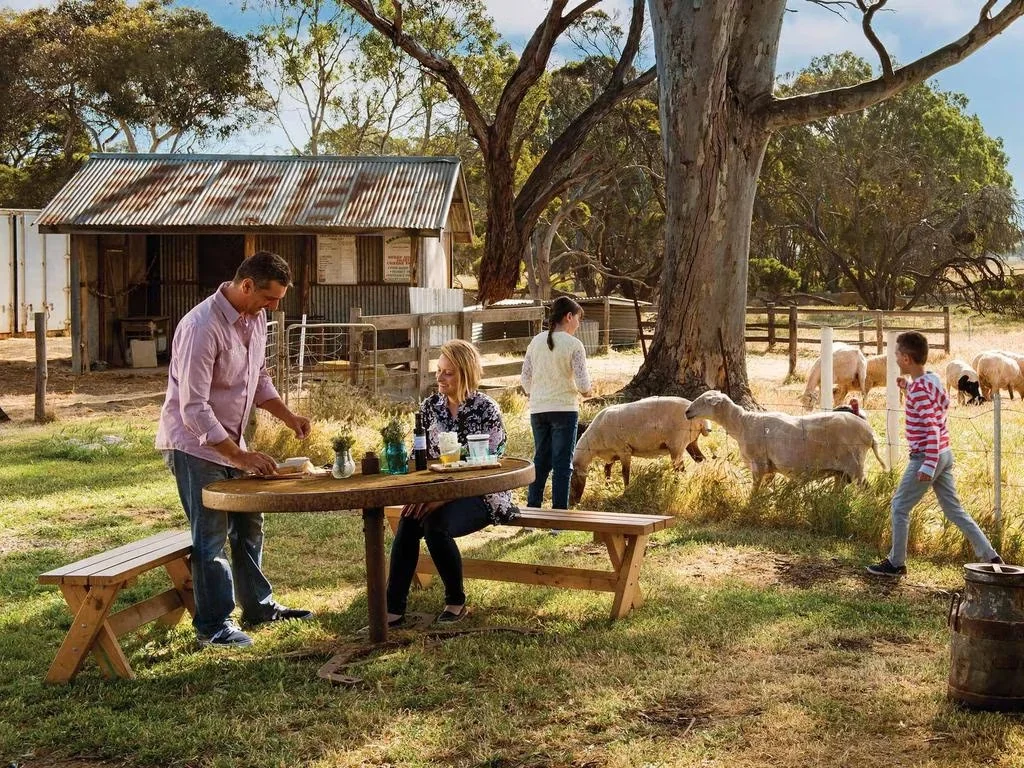Hentley Farm
Barossa Valley, South Australia
History of Hentley Farm
With a long history dating back to 1842 and a unique blend of Silesian (German) influences, the Barossa Valley is one of Australia’s most celebrated wine regions. Many family winemakers in the area have been grape growers and winemakers for six generations. This heritage extends to a vibrant and professional community of renowned producers, where locals and visitors alike share a passion for Barossa Valley wines, culture, and craftsmanship.
Chief Winemaker: Andrew Quin
Andrew Quin began his career in horticulture before transitioning into winemaking, combining his technical background with artistic creativity in pursuit of exceptional quality. Early in his career, he worked internationally—first with Sonoma producer St Francis Winery in California, then with Jacques Lurton in the Languedoc, France.
Upon returning to Australia, Andrew joined Yalumba, focusing on premium red wines in the Barossa. In 2008, he became Chief Winemaker at Hentley Farm, where he has since led the evolution of the vineyard with a modern approach to traditional Barossa varieties.
Andrew’s philosophy centers on thoughtful and minimal intervention, creating wines of balance, power, and elegance. His wines are known for their vibrancy, silky tannins, and intense flavor richness. They are expressive when young yet built with depth and structure for graceful aging.
Winemaker: Siobhan Wigan
Siobhan Wigan’s winemaking journey began with a Bachelor of Agricultural Science (Oenology) at the University of Adelaide. She gained early experience in Langhorne Creek and McLaren Vale, followed by vintages across several renowned wine regions including the Hunter Valley, Marlborough (New Zealand), and Sonoma County (USA).
In 2009, Siobhan joined Yalumba in the Barossa Valley and worked there for three vintages before moving to the Adelaide Hills. She joined Hentley Farm in 2014, where she has since played a vital role in shaping the winery’s portfolio.
Her approach is collaborative and rooted in sustainability, producing wines that reflect their varietal origins and the distinct terroir of the Barossa Valley. Siobhan focuses on minimal intervention, allowing the natural character of the grapes to shine. The wines are known for their balance, vibrancy, and varietal expression—crafted to pair beautifully with food and enjoyed among friends.
Our Home
At the heart of Hentley Farm is a deep commitment to nurturing the land. The estate is managed sustainably, with a focus on biodiversity, healthy soils, and thriving ecosystems supported by native vegetation and an on-site insectarium. Across the two estate vineyards, organic fertilizers are used, and from autumn through late winter, 400 sheep graze on natural grasses, reducing tractor passes and maintaining the land naturally.
Pest, disease, and weed management is carefully balanced to minimize environmental impact, using sprays only when necessary. Hentley Farm continues to trial new methods to eliminate pesticides and herbicides, supported by practices such as undervine mowing, midrow planting, and timed grazing. As members of Sustainable Winegrowing Australia, the winery reports all measures transparently, reinforcing its commitment to sustainability.
Sustainability
Emissions
In partnership with Edge Environment, Hentley Farm calculated its carbon footprint and established a reduction target aligned with the Science Based Targets initiative (SBTi). The winery aims to reduce scope 1 and 2 emissions by 42% by 2030, in line with the Paris Agreement’s goal of limiting global warming to 1.5°C. Efforts also extend to scope 3 emissions for a comprehensive sustainability approach.
Energy
Solar panels installed in 2015 now generate around 25% of the estate’s energy needs. In FY24, approximately 80% of energy used came from renewable sources, with a goal of achieving 100% renewable electricity by 2026.
Water
Hentley Farm uses soil moisture probes, mulch, and straw to enhance water retention. Rainwater collected from winery buildings supports operations, while inert gas and steam replace water wherever possible. Treated wastewater is repurposed for vineyard irrigation to minimize waste.
Waste Management
The winery emphasizes reducing, reusing, and recycling wherever possible. Grape marc and other organic matter are composted and returned to the vineyards to enrich the soil. Waste generation is monitored and reported through Sustainable Winegrowing Australia membership.
Sustainable Winegrowing Australia
At Hentley Farm, sustainability is more than a philosophy—it’s a promise. As a certified member of Sustainable Winegrowing Australia, the estate is dedicated to protecting the land, supporting the local community, and securing the future of Australian wine. Every decision, from vineyard to bottle, is guided by care for both people and the planet. This commitment ensures that the wines crafted today can be enjoyed by generations to come.
Winemaking Philosophy
The winemaking team at Hentley Farm maintains meticulous attention to detail. Each viticultural block and sub-row is assessed at harvest for optimal ripeness, with some vineyards receiving multiple picks throughout the season.
Minimal intervention remains at the core of Hentley Farm’s philosophy—producing wines of balance, power, and elegance. The hallmark characteristics of Hentley Farm wines include vibrancy, velvety tannins, and rich, layered flavor. These wines are approachable in their youth yet built for long-term cellaring, showcasing both varietal diversity and enduring quality.

